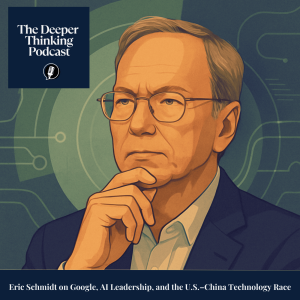
Tuesday Apr 22, 2025
Eric Schmidt, Google, and the Global Stakes of Artificial Intelligence - The Deeper Thinking Podcast
Eric Schmidt, Google, and the Global Stakes of Artificial Intelligence
In this episode, we explore Eric Schmidt’s vision of artificial intelligence not as an abstract future or market force—but as a geopolitical condition already underway. More than a profile, this is a meditation on temperament, strategy, and the ethics of speed. How does one of the digital era’s most influential minds think about leadership, trust, and the fragility of institutional strength under competitive pressure?
We trace the psychological and political architecture of the AI race, following Schmidt’s distinctions between founders and executives, startups and nations, urgency and judgment. His insights are neither nostalgic nor alarmist—but sharpened by decades of operational power. The result is a vision of intelligence—human and artificial—that demands not just innovation, but care.
Drawing from thinkers like Paul Virilio, Byung-Chul Han, Hannah Arendt, and Bernard Stiegler, we ask: how do we govern systems that learn faster than we can legislate? What happens when startup logic becomes geopolitical logic? And can our values survive the migration into code?
This is an episode about consequence, not just capability. About relevance, not just leadership. About what it means to build—and deserve—the future.
Why Listen?
- Understand how Eric Schmidt reads global AI competition through infrastructure, not ideology
- Explore the ethics of institutional power in the age of AGI and algorithmic acceleration
- Examine the risks of value displacement as AI development migrates across geopolitical systems
- Engage with thinkers like Virilio, Arendt, and Stiegler on speed, care, and the architectures of power
Listen On:
Bibliography
- Schmidt, Eric, Henry Kissinger, and Daniel Huttenlocher. The Age of AI: And Our Human Future. Boston: Little, Brown and Company, 2021.
- Virilio, Paul. Speed and Politics: An Essay on Dromology. Trans. Mark Polizzotti. Los Angeles: Semiotext(e), 2006.
- Han, Byung-Chul. The Transparency Society. Stanford: Stanford University Press, 2015.
- Arendt, Hannah. The Human Condition. 2nd ed. Chicago: University of Chicago Press, 1998.
- Moten, Fred. In the Break: The Aesthetics of the Black Radical Tradition. Minneapolis: University of Minnesota Press, 2003.
- Stiegler, Bernard. Technics and Time, 1: The Fault of Epimetheus. Trans. Richard Beardsworth and George Collins. Stanford: Stanford University Press, 1998.
Bibliography Relevance
- Eric Schmidt: Frames the episode’s central inquiry into leadership, foresight, and AI governance
- Paul Virilio: Provides the critical lens of speed as both advantage and hazard in political systems
- Byung-Chul Han: Explores the tensions between transparency, performance, and trust in techno-political systems
- Hannah Arendt: Offers a moral framework for understanding the intersection of action, freedom, and consequence
- Bernard Stiegler: Illuminates how technical systems shape—and displace—human temporality and responsibility
What if the most urgent question is not what we’re building—but who we trust to notice what it means?
#EricSchmidt #GoogleAI #ArtificialIntelligence #AILeadership #AGI #Geopolitics #ChinaUSA #PaulVirilio #ByungChulHan #HannahArendt #BernardStiegler #AIethics #FutureOfIntelligence #TheDeeperThinkingPodcast #TechGovernance #PhilosophyOfTechnology
No comments yet. Be the first to say something!